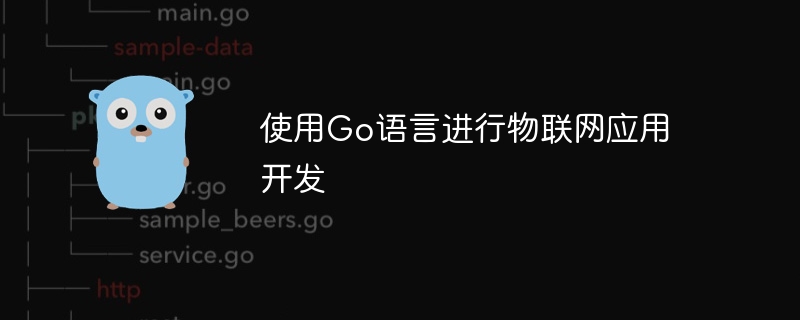

The Internet of Things (IoT for short) is one of the hot topics in the field of science and technology today. It connects various physical devices and sensors to the Internet to realize communication between devices. Data interaction and interconnection. With the development of technology, more and more enterprises and developers have begun to pay attention to and utilize IoT technology to develop various intelligent applications and solutions.
In the development of Internet of Things applications, the choice of programming language is very important. Go language is a powerful, efficient and reliable programming language that is becoming more and more popular among developers. It is easy to learn, has good concurrency, and has efficient memory management. It has broad application prospects in the field of Internet of Things.
First of all, the Go language is easy to learn, which allows beginners to quickly start developing IoT applications. Compared with other languages, the grammar of Go language is more concise and clear, without cumbersome grammatical structures and complex grammatical rules. This means that developers can save time learning the language and invest in actual application development faster.
Secondly, the Go language performs well in concurrency. In IoT applications, fast response between devices and real-time processing of data are very important. Go language can easily implement concurrent programming through lightweight goroutine and channel mechanisms, improving the system's response speed and processing capabilities. This enables developers to better handle data interaction and transmission between multiple devices and ensure efficient operation of the system.
In addition, the Go language also performs well in memory management. In IoT application development, memory usage and management is very important, because IoT devices often have limited resources and cannot withstand complex memory management operations. The garbage collection mechanism of the Go language can automatically manage memory, reduce the burden on developers, and improve the stability and reliability of the program.
In addition, the Go language also has rich standard libraries and powerful third-party library support, which makes it easier for developers to build various types of IoT applications. The standard library of the Go language contains many modules related to network communication, data processing and concurrent programming, which can greatly speed up the development process. Moreover, the open source community of the Go language is very active, and there are many excellent third-party libraries and frameworks to choose from and use, providing a variety of rich functions and solutions.
To sum up, the Go language has many advantages in IoT application development, such as being easy to learn, good concurrency, and efficient memory management. It can help developers quickly build efficient and reliable IoT applications to meet the growing needs of the IoT market. In the future, with the continuous development of the Internet of Things, the Go language will play an increasingly important role in the development of Internet of Things applications and become one of the indispensable tools for developers.
The above is the detailed content of IoT application development using Go language. For more information, please follow other related articles on the PHP Chinese website!
 What are the applications of the Internet of Things?
What are the applications of the Internet of Things?
 Usage of Type keyword in Go
Usage of Type keyword in Go
 How to implement linked list in go
How to implement linked list in go
 What are the Go language programming software?
What are the Go language programming software?
 How to learn go language from 0 basics
How to learn go language from 0 basics
 What are the methods to implement operator overloading in Go language?
What are the methods to implement operator overloading in Go language?
 What are the operators in Go language?
What are the operators in Go language?
 The m2m concept in the Internet of Things
The m2m concept in the Internet of Things




